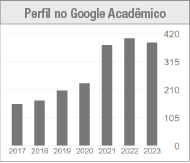About the Journal
- Focus and scope
- Frequency
- Qualis
- Policies and assessment flow
- Fees (Open Access Policies)
- Code of ethics and best practices for publication
- Conflict of interests
- Verification of originality
- Plagiarism policy
- Complaints, appeals and post-publication speeches
- Urdimento indexing
- Social media
- Privacy Policy
- Simultaneous submissions and multiple publications
- Free Access Policy
- Archiving Policy
- History of Urdimento
Focus and Scope
URDIMENTO – A Journal that focus on Performing Arts studies, founded in 1997 - is a regular publication of the Post-Graduate Program in Theatre, of the Arts Center, of the State University of Santa Catarina (UDESC). Based on the privileged dialogue between professors and researchers, the journal is committed to the creation of a thematic body of research, promoting stimulus and theoretical support for future reflections on different themes addressed in the large area of performing arts.
Urdimento publishes original and unpublished works originated from theoretical studies, practical experiments, research and reflections, current and historical, seeking to offer its readers texts of quality and excellence, both from Brazilian and foreign researchers, as well as translations of works by foreign researchers.
Urdimento publishes unpublished texts in Portuguese or Spanish, and their versions in English.
The Urdimento - Journal of Performing Arts Studies - objectives:
I - To establish itself as a channel for the dissemination of recent and innovative studies in the area of concentration of the PPGAC - Performing Arts -, and in its four lines: Body, Performativity and Animation Theater; Political images; Performing Arts Pedagogy; Theatre, Society and Scenic Creation.
II - To develop the interchange among researcher(s) and professionals acting in the area of Performing Arts.
III - Encourage the interchange of information and experiences among national and/or foreign institutions.
IV - Encourage the debate of theoretical-methodological issues related to the Performing Arts.
V - Disseminate original and inedited publications of: articles, reports, dramaturgies, interviews, reviews and documents related to research in Performing Arts.
Periodicity: Continuous - with thematic dossiers expected to be published in April, September, July and December of each year.
Qualis: A1
Policies and assessment flow
- Conformity of the text to the rules established by the journal.
- Pertinence og the article to the journal.
- Originality.
- Timeliness and relevance of the topic.
- Clarity and adequacy of the title to the purpose of the article.
- Brief, clear and understandable summaries and their relationship to the article.
- Keyword consistency.
- Clarity of objectives.
- Structure and organization of the article regarding coherence.
- Methodological consistency.
- Theoretical foundation.
- Pertinence, relevance and timeliness of bibliographical references.
- Author reflections.
- Coherence and pertinence of the arguments.
- Final considerations consistent with the proposed objectives.
- Language and writing quality.
- Verification and adequacy of the article to the journal section to which it was submitted.
Fees (Open Acess Policies)

Code of ethics and best practices for publishing

· Submissions and review details are kept confidential.
· The texts sent to Urdimento – Revista de Estudos em Artes Cênicas, will be evaluated, by the double-blind review system, by two reviewers appointed by the Editorial-in-Chief among the body of the Journal's Board of Reviewers.
Urdimento indexing
Urdimento was launched in 1997 as a periodical of the Theater Research Center for Latin America, of the Center of Arts (CEART) and the State University of Santa Catarina (UDESC), having Professor André Carreira as its creator and editor until 2003.
In 2004 Urdimento became a journal of the Post-Graduate Program in Theater (PPGT). The editorship passed to the charge of Edélcio Mostaço and its annual periodicity was normalized. In 2005 Urdimento conquered the concept A next to CAPES's qualis for national periodicals.
In 2006 the Urdimento's editorship adopted the policy of publishing in the cover and in the back cover images of plays produced in the disciplines of Theatrical Assemblage I and II of CEART's graduation course in Theater.
In 2007 the journal takes on the definitive nomenclature, which it keeps until today (2021), being called Urdimento - Journal of Performing Arts Studies.
In 2008 Urdimento reformulated its internal structure by adopting the thematic dossiers in its sections. And it became a biannual journal. Changes in structures also occurred in 2011 when the section Photo-Essay of Performances was created, with the intention of giving visibility to the scenic processes of CEART's teachers and students, creating a historical record of their productions.
With v. 1 n. 22 (2014) Urdimento ceased to be printed and became an exclusively online periodical, thus adapting to the new media and propositions of national and international periodicals. And the changes continued when in 2017 this journal became a four-monthly edition. And it was its viability as an online journal that enabled its maintenance and growth during the 2020/2021 pandemic.
The changes of Urdimento, throughout the twenty-five years of its history (1997-2023), reveal that this journal remains alive and in permanent search of approaching the contemporary or historical theater thought and practice. And, with that, Urdimento reinvents itself and appropriates itself of the new tools coming from the implementation of the Master's and Doctorate courses in Theater, with CEART/UDESC. In this path, different editor(s) have assumed the responsibility of continuing to produce this relevant periodical, today qualis A1 at CAPES, and have narrowed the links between artistic production at graduation and theoretical/practical reflection at post-graduation.



